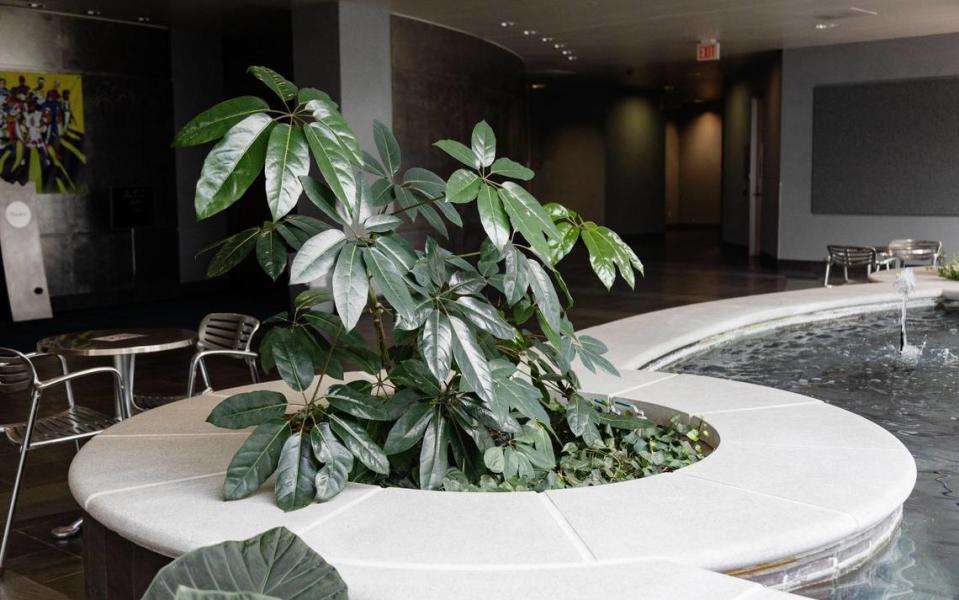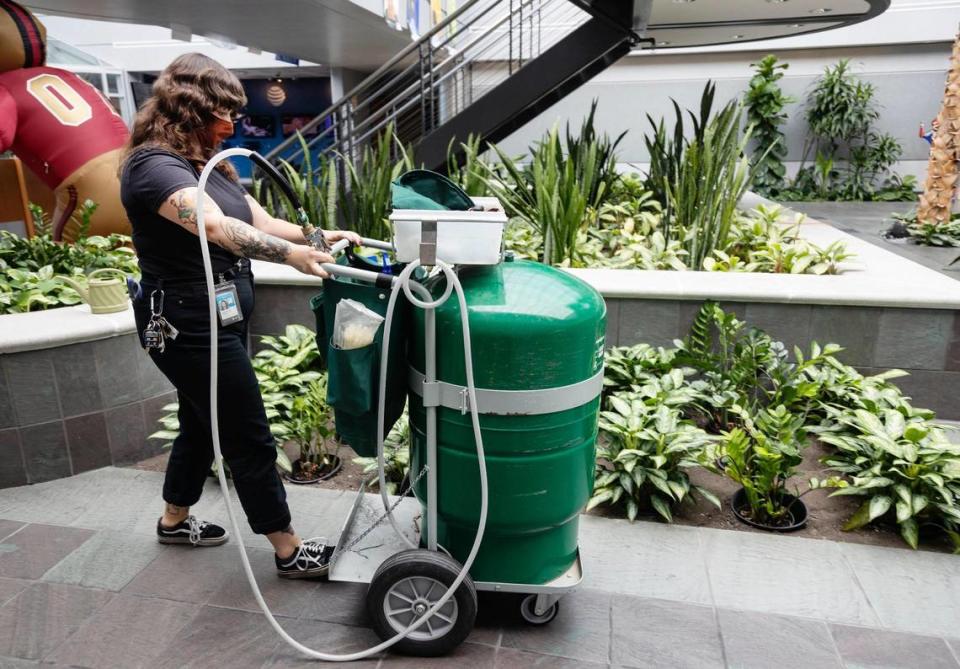Who maintained the plants when COVID-19 closed offices? This longtime Boise business
When the coronavirus pandemic struck 18 months ago and many Idaho office workers got sent home, it wasn’t just desks and chairs that got left behind.
Office plants were also abandoned.
But for clients of one Boise business, those plants didn’t wither and die. They continued to receive care and regular watering.
Natalie Whiting, an employee of The Potting Shed, handles about 30 accounts across the Boise area. On a given day, she services plants at five to 10 businesses.
“We are available for people who either aren’t very good at care of the plants or just don’t want to have to deal with that responsibility,” Whiting, 27, said during an interview. “We’ll do anything from big atriums to desk plants on file cabinets.”
Between 10% and 20% of the office buildings where Whiting takes care of the plants shut down early in the pandemic, she said. About 80% operated with skeleton crews, while most of their workers were sent home to work.
Whiting herself was given the option to keep working or to quit temporarily and then return when she felt comfortable. There was a lot unknown when the pandemic began, she said, including how much workers were at risk of being infected with the coronavirus while interacting with other people.
“My boss provided me with personal protective equipment such as clothing and I started wearing a mask early, before most places started requiring them,” she said.
Whiting said she wasn’t particularly concerned about getting infected at the businesses where she went to take care of plants. She was more concerned with going to the grocery store and other places to pick up necessities, where there were far more people.
“Obviously, I’m young and I’m healthy, and I was not too concerned about personally getting sick, or, if I did get sick, of being hospitalized,” Whiting said. “I’ve been more concerned about being a carrier and spreading it.”

Potting Shed history
Whiting studied horticulture technology at the College of Western Idaho in Nampa. She left school one semester short of earning an associate’s degree in 2016. She had worked an internship at North End Organic Nursery and jumped at a chance to work at The Potting Shed after seeing an ad online.
After an interview, they hired her on the spot. Whiting has worked there ever since.
The Potting Shed, which has six employees, was started in 1972 by Al Erquiaga, one of the founding members of Boise’s Oinkari Basque Dancers. Dave Fellows, whose family owned Jim’s Coffee Shop across the parking lot from the Boise Co-Op, bought it in 1990. Erquiaga, one of his customers at the coffee shop, told Fellows he was getting ready to retire, and their conversation led to the sale.
“I’d only had a couple of plant biology classes in college, but had always had a house plant or two, and my mom had always had some, so it seemed like a good thing to do,” Fellows said in a phone interview.
A lot of people in the community, Whiting said, don’t realize there’s a company that supplies plants to homes and offices — and then maintains them.
“I get that a lot,” Whiting said. “It’s very behind the scenes.”

Clients across the Treasure Valley
On a recent day, Whiting serviced one of her largest accounts, an AT&T call center in Meridian. The building has a large atrium filled with ficus; Chinese evergreens; Schefflera, also known as an umbrella tree; and Sansevieria, also known as snake tongue or mother-in-law’s tongue.
There are also a number of preserved palm trees that at first glance appear to be living, but aren’t.
The light-filled atrium does best with tropical plants that require a lot of light, Whiting said. Other offices have less light, and although some clients are willing to install special lighting for their plants, most want Potting Shed employees to pick what works best for their location.
“We generally stick to maybe 20 plants that are readily available at nurseries,” Whiting said. “We’ll always ask clients, ‘Do you want something smaller here, do you want something tall on the floor in this corner, are you looking for more blooming things, more greenery?’ ”
She goes to the AT&T building three times a week. Most of her accounts require service less often, she said.
Growing during the pandemic
The pandemic brought a lot of changes to the business, Fellows said. Some businesses that had closed their offices arranged for someone to meet his employees when plants needed water or other attention. Others supplied them with keys, door badges or entry codes.
“In some places that already had low light and didn’t have employees coming in to turn on their office lights, we had to move them closer to a natural source of light,” Fellows said.
While there were concerns early on about how the pandemic would affect the company, Fellows said it has thrived. The Potting Shed has added a number of clients and now serves more than 100 companies and families.
“We only lost a couple of accounts where the businesses shut down,” he said. “A lot of ones we gained were new businesses or ones that planned to contract with us before the pandemic. It’s a town that’s growing like crazy, and that’s where the opportunities are.”
While being around plants all day is a pleasant experience, Whiting said there are times when people toss trash or water a plant inside a restaurant with a drink.
“That’s the rude behavior we have to put up with sometimes,” she said. “We’ll ask security people to ask people not to do that. It still bothers me.”

 Yahoo Movies
Yahoo Movies 
